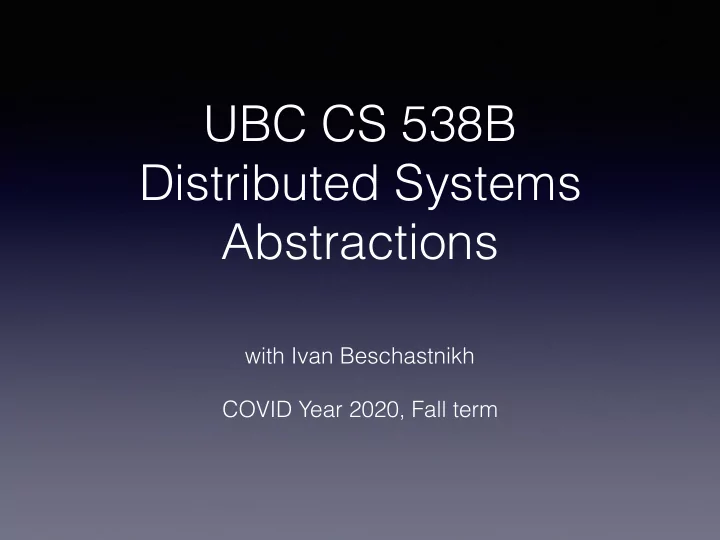

UBC CS 538B Distributed Systems Abstractions with Ivan Beschastnikh COVID Year 2020, Fall term
Agenda for our first class • Who am I, and who are you? • Online format • Survey results • Course overview; reading research papers • Break • Distributed systems discussion
Who am I? • Call me Ivan • I'm in Vancouver (actually live on UBC campus) • Have been at UBC for 7 years • Before that worked on my PhD at U.Washington • Broad research interests, usually intersecting with distributed systems in some way • I teach UBC grad + ugrad distributed system courses
Who are you? • We are distributed across 4 countries Let’s go around! 1. What is your name ? CS MSc/PhD/other program ? 2. Where are you connecting from? 3. What is one interesting fact about yourself ?
New this year: online format • The atmosphere in the classroom is key • Generally, there won’t be slides Discussion-focused course • Note: my first time teaching online • Looking forward to figuring this out together with you, would like to hear your suggestions!
Format guidelines • Respect for each other • Active participation • My camera will always be on • Your camera use is optional, but recommended. Try to at least turn camera on at start and end of class. Consider putting up a photo if you switch off camera. • Ask questions in chat, or interrupt by voice/raise hand • Let’s make an effort to be clear: speak slowly and clearly Other suggestions/ideas?
Other survey results • Reached consensus quickly ➡ No final ➡ Open-ended project ➡ Recorded zoom calls (only available to class) Show survey results
Course resources overview • Canvas : place to find zoom links • Zoom : this magic place we are all in • Piazza • Use this for all course-related communication • Slack ( optional ) • Place to hang out, good for project work
Structure of the course • Schedule with papers • Advocate/skeptic roles • Project details • Marking details • How to do well • Honesty • Taking care of yourself Review homepage
Reading research papers (Today’s readings) • The three pass approach by Keshav 1. Bird eye’s view (note order of sections) 2. Careful read 3. Virtually re-implement the paper
Reviewing papers (Today’s readings) • Roscoe’s suggestions • “A review is a chance to get your own thoughts on the paper straight by writing them down. It’s surprising how your opinion of a paper can change by being forced to explain it.” Responses advice on homepage https://www.cs.ubc.ca/~bestchai/teaching/cs538b_2020w1/responses.html
Volunteer advocate/skeptics for next week • Tuesday : Fundamentals of Distributed Computing: A Practical Tour of Vector Clock Systems • Advocate: Shiqi • Skeptic: Mayank • Thursday : Distributed Snapshots: Determining the Global States of a Distributed System. • Advocate: Lucca • Skeptic: Fangyu
Distributed Systems • What are they? • A system where components may fail • A network with inter-dependent computers • Is RAID a distributed system? (no network) • Anything that requires more than one machine ? • Concurrency (versus parallelism) • Concurrency = executing at same time (independent processes) • Parallelism = group work of multiple tasks • Multiple cores in a CPU? (2 say yes!)
Distributed Systems • Why build them / what are their advantages? • Security : distribute information across parties • Fault tolerance : one failure doesn’t bring down the system (redundant copies of data) • Scalability : support more users/workload • Why not build them / what are the disadvantages? • SE challenge: splitting logic into components • Complexity: SE and design challenge • Security: data in more places; risk goes up because there are more places where you can be vulnerable
D. Systems Abstractions • What do you think would be some distributed systems abstractions that might be useful? 1. Name a (potential) abstraction 2. How is it useful? • Reliable communication : ensure message delivery • Sharding : split data into chunks and assemble chunks from different machines (data is a collection of chunks) • Map reduce: distribute compute abstraction
Next class • Distributed time reading • Slightly theoretical • Fundamental abstraction!
Post-class short survey • I’ll post on piazza a short survey about what worked well and what you wish could be done better. • Please answer it to give me some feedback :-)
Recommend
More recommend